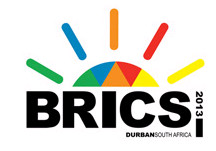
Academics from the BRICS countries – Brazil, Russia, India, China and South Africa – this week established a policy think-tank ahead of the fifth BRICS summit to be held in Durban.
South Africa called for strengthening research collaboration and academic exchange in the global South, and placing knowledge production at the heart of the emerging country bloc.
Academics from the BRICS countries – Brazil, Russia, India, China and South Africa – this week established a policy think-tank ahead of the fifth BRICS summit to be held in Durban.
South Africa called for strengthening research collaboration and academic exchange in the global South, and placing knowledge production at the heart of the emerging country bloc.
As the latest country to join the group of emerging nations, South Africa was the only member that did not yet have a BRICS think-tank to conduct policy analysis and inform the long-term strategy of the bloc.
An academic forum was held at Durban University of Technology from 10-13 March, two weeks before South Africa hosts the annual BRICS leadership summit in the coastal city. Its aims include establishing a consortium of BRICS think-tanks and a business council.
Brazil, Russia, India and China were each represented by 10 academics, with South Africa as the host inviting more to broaden the academic base of discussions at the forum, under the theme “BRICS and Africa: Partnership for development, integration and industrialisation”.
Speaking at the forum, Minister of Higher Education and Training Blade Nzimande said: “One of the most important elements of BRICS cooperation should be in the sphere of knowledge production and academic cooperation.
“To achieve our goals – both in Africa and the world – we need constantly to strengthen our scientific and technical knowledge in all spheres, to deepen our understanding of our societies and those of the rest of the world, and to refine and improve our development strategies.
“To these ends, we must strengthen cooperation between ourselves, develop joint research projects, academic exchange projects and deepen the dialogue between our academics.”
Expanded cooperation in postgraduate studies was a priority.
Member countries boasted excellent universities and colleges that battled to meet people's expectations, said Nzimande. Academic cooperation could strengthen these institutions and “expand the frontiers of human knowledge”.
Most South African universities had stronger ties with institutions in the West than with those in other developing countries. While this collaboration was beneficial and should continue, it was an anomaly that “ties with countries that face similar challenges of development are relatively weak”, Nzimande argued.
“Economists and economic historians in South African universities, for example, tend to know more about the British or American paths and strategies of economic development than about those of contemporary developing countries in Asia or Latin America, whose challenges are more similar to our own.” It was likely that similar knowledge gaps about Africa existed in other developing countries, including the BRICS.
According to Gwebinkundla Qonde, director-general of the Department of Higher Education and Training, the forum considered what contributions were needed from academics to bolster BRICS efforts, as well as whether academics could take the lead in the policy suggestions and knowledge production required to realise those objectives.
"We hope to better position our academics to contribute towards enhancing and developing BRICS using South Africa as a platform," she said.
Nzimande said that South Africa would imminently establish a National Institute for the Humanities and Social Sciences, to strengthen studies in these disciplines and build ties with scholars across Africa and the global South.
The government has appointed the Human Sciences Research Council, or HSRC, as an incubator for the South Africa BRICS think-tank for one year.
HSRC CEO Olive Shisana said the organisation had extensive experience and specialisation in social policy research and could thus anchor the think-tank structure and provide support for BRICS-related policy dialogues.
It would create a forum to facilitate discussion among academics, policy-makers and non-governmental organisations interested in the BRICS developmental strategies.
"Scholars can make contributions to government policies and related research projects with the objective of immediate and tangible impacts on the strategic economic, social and geopolitical policies of the country," Shishana said.
The HSRC would cooperate with local experts and organisations to strengthen and build analytical and scholarly capacity in this field. This was crucial in creating networks and stimulating fresh thinking in relation to BRICS and "not simply repeating what others are doing".
"Scholars will be able to make contributions to government policies and related research projects, with the objective of immediate and tangible impacts on the strategic economic, social and geopolitical policies of the country," Shisana said.
Story by Nicola Jenvey
Source: University World News
